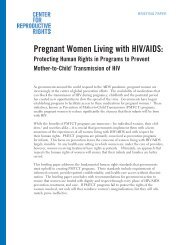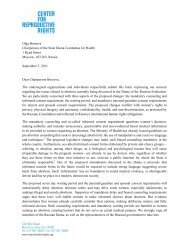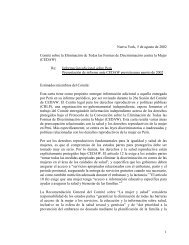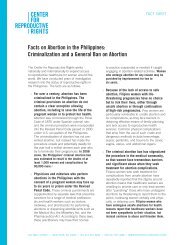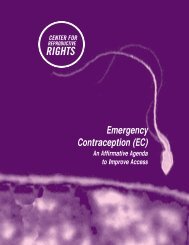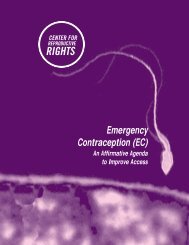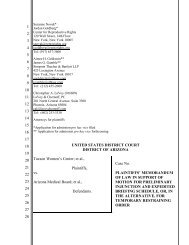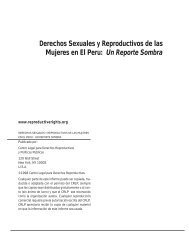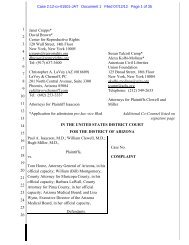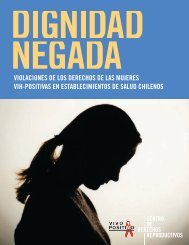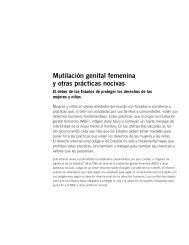CRR Annual Report 2009 - Center for Reproductive Rights
CRR Annual Report 2009 - Center for Reproductive Rights
CRR Annual Report 2009 - Center for Reproductive Rights
You also want an ePaper? Increase the reach of your titles
YUMPU automatically turns print PDFs into web optimized ePapers that Google loves.
Around the world, battles are waged to control women’s<br />
reproduction—sometimes <strong>for</strong>cing women to have<br />
children against their will, other times preventing them<br />
from having children they want. Marginalized women,<br />
such as those living with HIV or serving time in prison,<br />
often suffer unthinkable brutality and humiliation, and<br />
very rarely is anyone held accountable.<br />
The <strong>Center</strong> has always fought to win justice <strong>for</strong> women<br />
who have endured grave abuses. In February <strong>2009</strong>, we<br />
took Francisca’s case to the Inter-American Commission<br />
on Human <strong>Rights</strong>. Working with the Chilean HIV/<br />
AIDS group Vivo Positivo, we asked the commission to<br />
urge Chile to provide Francisca with compensation <strong>for</strong><br />
her loss and to adopt policies that will guarantee that<br />
women living with HIV retain the power to make their<br />
own decisions about childbearing. (Read our interview<br />
with Francisca on opposite page.)<br />
There is no justification <strong>for</strong><br />
denying any woman the<br />
right to control what happens<br />
to her body, and the <strong>Center</strong><br />
is committed to defending<br />
the reproductive rights of<br />
every woman.<br />
We also fight <strong>for</strong> women punished <strong>for</strong> terminating<br />
pregnancies, such as Lena,* a young, poor woman from<br />
Moldova who had an abortion at home. Suffering from<br />
severe blood loss, she rushed to a local hospital, only to<br />
be reported to the police by doctors. Even though there<br />
is no criminal penalty under Moldovan law <strong>for</strong> women<br />
who have illegal abortions, the police charged Lena<br />
with intentional and premeditated murder, and she was<br />
sentenced to twenty years in prison.<br />
As in many other places, families and communities<br />
in Moldova often shun women who become pregnant<br />
outside of marriage or have abortions, making it difficult<br />
<strong>for</strong> someone in Lena’s situation to receive fair treatment.<br />
Lena encountered rampant sex discrimination: male<br />
prison guards humiliated her, she was denied postabortion<br />
care while awaiting trial even though<br />
she was continuously bleeding, and the prosecutor<br />
repeatedly targeted her with disparaging remarks.<br />
Together with the Moldovan Institute <strong>for</strong> Human <strong>Rights</strong>,<br />
we took Lena’s case to the European Court of Human<br />
<strong>Rights</strong> in February, demanding her immediate release<br />
from prison and pressing Moldova to ensure that women<br />
who have abortions are not treated as criminals.<br />
There is no justification <strong>for</strong> denying any woman the right<br />
to control what happens to her body, and the <strong>Center</strong><br />
is committed to defending the reproductive rights of<br />
every woman. In the United States, we are taking on<br />
the inhumane shackling of female prisoners during<br />
childbirth, a common practice across the country. In<br />
<strong>2009</strong>, we successfully lobbied <strong>for</strong> an anti-shackling bill<br />
in New York, which in August <strong>2009</strong> became one of six<br />
states to ban the practice. We also helped to win an<br />
important victory <strong>for</strong> Shawanna Nelson, a <strong>for</strong>mer inmate<br />
who was <strong>for</strong>ced to give birth to her son with her legs<br />
shackled, even after she begged a prison guard to<br />
remove them. In October, a federal appeals court<br />
allowed Nelson’s lawsuit against Arkansas prison<br />
officials to proceed; we demonstrated in a friend-ofthe-court<br />
brief that the practice violated both the U.S.<br />
Constitution and international human rights laws.<br />
When it comes to reproductive rights, authorities<br />
are often content to sweep abuses under the rug,<br />
especially when the women in question are already<br />
being discriminated against or ostracized. Our work is<br />
not just about winning justice <strong>for</strong> individual women—it<br />
is about challenging impunity <strong>for</strong> endemic assaults on<br />
women’s basic dignity so that no other woman has to<br />
endure the same horrific abuses.<br />
*The names of our clients have been changed to<br />
protect their confidentiality.<br />
24



